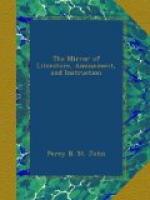But among all its united trophies of art and nature, there is not one more brightly endowed with picturesque beauty, or romantic association, than the fortress of Ehrenbreitstein. When the eye of our own Childe Harold rested upon its “shattered wall,” and when the pencil of Turner immortalized its season of desolation, it had been smitten in the pride of its strength by the iron glaive of war: and its blackened fragments and stupendous ruins had their voice for the heart of the moralist, as well as their charm for the inspired mind of genius. But now that military art hath knit those granite ribs anew,—now that the beautiful eminence rears once more its crested head, like a sculptured Cybele, with a coronet of towers,—new feelings, and an altered scale of admiration wait upon its glories. Once more it uplifts its giant height beside the Rhine, repelling in Titan majesty the ambition of France; once more, by its united gifts of natural position and scientific aid, it appears prepared to vindicate its noble appellation of “the broad stone of honour.”
* * * * *
THE MUSICAL SOUVENIR.
This is an elegant little collection of seven songs, a trio, duet, and glee, set to music, or “as they are appointed to be said or sung.” As we have not our musical types in order, we can only give our readers a specimen of its literary merits. The first piece is Akenside’s beautiful Invocation to Cheerfulness; this is pleasingly contrasted with a Song to the Forget-me-not, by Mrs. Opie. Then follow five pieces from recent volumes of Friendship’s Offering and the Amulet. The three remaining compositions (expressly for the work) are a Song by T. Bradford, Esq.; a Scotch Song, by Mr. Feist; and the following pathetic Lines, by the Rev. Thomas Dale:—
Oft as the broad sun dips
Beneath the western
sea,
A prayer is on my lips,
Dearest! a prayer
for thee.
I know not where thou wand’rest
now,
O’er ocean-wave, or mountain brow—
I only know that He,
Who hears the
suppliant’s prayer,
Where’er thou art, on
land or sea,
Alone can shield
thee there.
Oft as the bright dawn breaks
Behind the eastern
hill,
Mine eye from slumber wakes,
My heart is with
the still—
For thee my latest vows were said,
For thee my earliest prayers are pray’d—
And O! when storms shall lour
Above the swelling
sea,
Be it thy shield, in danger’s
hour,
That I have pray’d
for thee.
Whether we consider the purity of its sentiments and the amiable tone of feeling, or its merit as a musical work, we are induced to recommend the present volume as an elegant present for a musical friend, and it will doubtless become a favourite with thousands of graceful pianists. Thanks to the Muses, our lyrical poetry is rapidly rising in the literary scale, when such beautiful compositions as those of Mrs. Hemans and Miss Landon are no sooner written than set to music.




